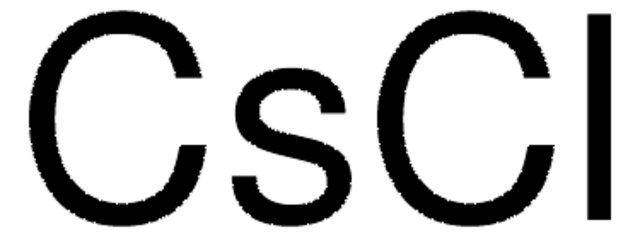746487
Cesium chloride
anhydrous, free-flowing, Redi-Dri™, ReagentPlus®, 99.9%
Sign Into View Organizational & Contract Pricing
All Photos(8)
About This Item
Linear Formula:
CsCl
CAS Number:
Molecular Weight:
168.36
EC Number:
MDL number:
UNSPSC Code:
12352302
PubChem Substance ID:
NACRES:
NA.55
grade
anhydrous
Quality Level
product line
ReagentPlus®
Redi-Dri™
assay
99.9%
form
powder or crystals
quality
free-flowing
pH
6-7.5
mp
645 °C (lit.)
SMILES string
[Cl-].[Cs+]
InChI
1S/ClH.Cs/h1H;/q;+1/p-1
InChI key
AIYUHDOJVYHVIT-UHFFFAOYSA-M
Looking for similar products? Visit Product Comparison Guide
Related Categories
General description
Cesium chloride is a cesium halide. Cesium halides can be prepared by reacting cesium carbonate with corresponding hydrohalic acids. Cesium chloride ultracentrifugation method has been reported for the extraction of RNA from cellular fractions.
Application
Cesium chloride is used for the preparation of electrically conducting glasses. It is also used to make solutions for the separation of RNA from DNA by density gradient centrifugation.
Features and Benefits
- Increased efficiency – Eliminate time and effort of loosening hardened powders
- Safety – Avoid risks of using tools of force to break up clumps
- Economy – Faster preparation and solvation increase productivity and reduce costs
- Assured quality – Excellent, expert-tested quality with no anti-caking agents
- Flexible volumes – Available from research amounts to scale-up quantities
Legal Information
ReagentPlus is a registered trademark of Merck KGaA, Darmstadt, Germany
Redi-Dri is a trademark of Sigma-Aldrich Co. LLC
signalword
Warning
hcodes
Hazard Classifications
Repr. 2
Storage Class
13 - Non Combustible Solids
wgk_germany
WGK 1
flash_point_f
Not applicable
flash_point_c
Not applicable
Certificates of Analysis (COA)
Search for Certificates of Analysis (COA) by entering the products Lot/Batch Number. Lot and Batch Numbers can be found on a product’s label following the words ‘Lot’ or ‘Batch’.
Already Own This Product?
Find documentation for the products that you have recently purchased in the Document Library.
Customers Also Viewed
Gloria Patricia Barrera et al.
BMC genomics, 16, 1008-1008 (2015-11-27)
Baculoviruses are insect-associated viruses carrying large, circular double-stranded-DNA genomes with significant biotechnological applications such as biological pest control, recombinant protein production, gene delivery in mammals and as a model of DNA genome evolution. These pathogens infect insects from the orders
Jie Wu et al.
Oncology reports, 35(1), 243-252 (2015-11-05)
Multigene-based combination therapy may be an effective practice in cancer gene therapy. Substantial studies have demonstrated that tumor suppressor p53 acetylation is indispensable for p53 activation. Inhibitor of growth 4 (ING4), as a novel tumor suppressor, is capable of remarkably
Ian C Jenkins et al.
Proceedings of the National Academy of Sciences of the United States of America, 111(13), 4803-4808 (2014-03-19)
The degree to which DNA-linked particle crystals, particularly those composed of micrometer-scale colloids, are able to dynamically evolve or whether they are kinetically arrested after formation remains poorly understood. Here, we study a recently observed displacive transformation in colloidal binary
Keita Nishiyama et al.
Bioscience, biotechnology, and biochemistry, 78(8), 1444-1451 (2014-08-19)
The aim of this study was to assess the adhesion of Bifidobacterium strains to acidic carbohydrate moieties of porcine colonic mucin. Mucins were extracted and purified via gel filtration chromatography followed by density-gradient ultracentrifugation. The presence of sulfated and sialylated
D R Alves et al.
Applied and environmental microbiology, 80(21), 6694-6703 (2014-08-26)
Biofilms are major causes of impairment of wound healing and patient morbidity. One of the most common and aggressive wound pathogens is Staphylococcus aureus, displaying a large repertoire of virulence factors and commonly reduced susceptibility to antibiotics, such as the
Our team of scientists has experience in all areas of research including Life Science, Material Science, Chemical Synthesis, Chromatography, Analytical and many others.
Contact Technical Service

